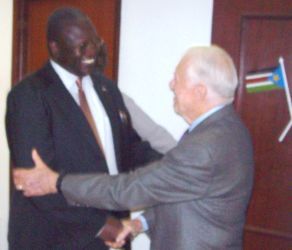Machar and Carter discuss challenges on elections and referendum
By James Gatdet Dak
February 13, 2010 (JUBA) – The former US President, Jimmy Carter, visited Southern Sudan’s capital, Juba, this week to acquaint himself with the elections process and some other challenges on the road to referendum in the region after meeting with higher authorities in the national capital, Khartoum.
Carter also met with Southern Sudan president Salva Kiir Mayardit and officials of the `elections commission in Juba.

The Center also sponsors health projects for eradication of guinea worm disease in Sudan.
The Vice President of the Government of Southern Sudan, Dr. Riek Machar Teny, who also chairs the SPLM negotiating team with the ruling dominant NCP on CPA implementation, on Friday briefed Carter on a number of challenges, if they remain unresolved, would likely be encountered during the April elections as well as in the process towards the conduct of referendum in 2011.
He highlighted the contentious results of the 2008 population census which put the South at 8 million people and automatically affected the proportional representation of the region at the national level.
The contentious census results reduced the South to 21% of the overall nearly 40 million population of the country, falling short of one-thirds representation which was temporarily reached at in the CPA’s power sharing agreement.
Southern Sudan leadership rejected the results, arguing that the census was not properly conducted and therefore did not reflect the true population of the region.
He explained that this would weaken the South at the national level incase of any amendments in the country’s post-election interim constitution by the National Assembly, saying the semi-autonomous region would have no enough votes to block such amendments even if they would affect the gains of the South and conduct of referendum in January next year.
Machar who has been negotiating for a compromise on the issue said his party initially proposed 60, and then dropped to 40 additional seats for the South at the national parliament in order to compensate for the census losses.
The proposal, he said, was however rejected by the NCP which was more comfortable discussing only 24 seats while dragging on with the talks.
He also criticized the NCP for refusing to repeal some sections of the National Security law by holding on to provisions that would affect the conduct of elections.
These, he explained, included the national security organ’s power to search, arrest and detain a suspect(s), warning that the NCP would definitely use such powers to intimidate individuals and groups from exercising their freedom of expression and assembly, hence denying free and fair elections.
He pointed out that his party wants such repressive provisions to be suspended at least during the elections.
Earlier, the SPLM proposed that such powers would be transferred to the police and the security organ would confine itself to collecting and analyzing information before presenting it to the relevant body for action.
With a voter to cast 12 ballots in the South, Machar also expressed concern that the majority of the people of Southern Sudan are illiterate and most of them never participated in elections before, adding that the voting stations might also be intimidating to them if not well organized.
The meeting was also briefed about the ongoing negotiations between SPLM and NCP on the formation of the Southern Sudan Referendum Commission and Abyei Referendum Commission. The contentious issue is the nominations of chairmanships for the two respective referendum commissions, he told the former American President.
He however expressed hope that the next meeting of the Presidency in Khartoum might resolve the issue.
The issue of non-demarcation of the North-South border was also highlighted as a challenge in the conduct of both elections and referendum.
As the newly appointed chairperson to head the Southern Sudan Referendum Taskforce, Dr. Machar also briefed Carter on the issues of post-referendum arrangements.
The Taskforce is charged with the responsibility of assessing the process of the conduct of referendum and post-referendum scenarios while providing political guidance to the government in the South in overseeing its exercise.
The Taskforce shall operate as a separate body and in coordination with the would-be formed technical Southern Sudan Referendum Commission.
The Carter Center has currently established a branch office in Juba to monitor the elections in the ten states of Southern Sudan and may also extend its monitoring service to the conduct of referendum in January 2011.
In the referendum the people of Southern Sudan shall vote to choose between confirming the current unity of Sudan and forming their own independent country.
The people of Abyei shall concurrently vote to choose between remaining in the North and joining the South, while there shall be popular consultations in Southern Blue Nile and Southern Kordufan states to determine their respective future political and administrative statuses within the geographical North.
(ST)

mayor
Machar and Carter discuss challenges on elections and referendum
wow is that true.
SPLA-SPLM forard ever back worad never
and people pleas make wait for his mentail disorder suppoter
mr newly Haaaaaaaaaaaaaaaaay.
Time1
Machar and Carter discuss challenges on elections and referendum
This is a very good meeting, mr Carter is highly welcome to Sudan, he has made enourmous contributions from political reforms and health services in many countries, the Carter elections monitors are very important for Sudan coming elections votes and also for referendum votes.